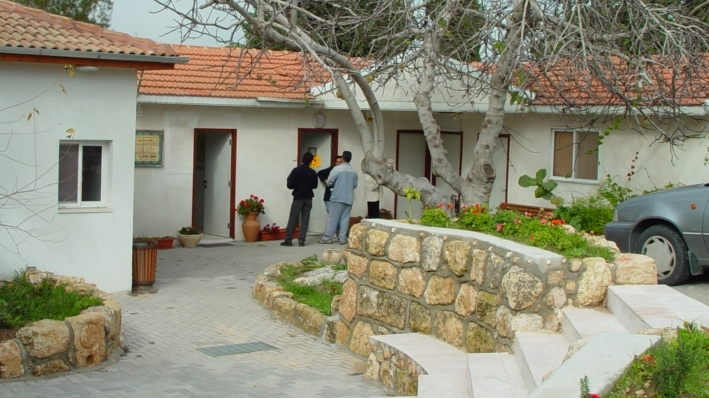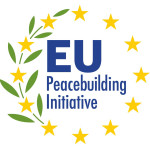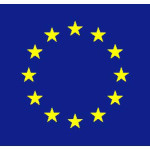Program for the 2016-2017 activity year
(Last updated October 10, 2016)
Change Agents Courses
Developing New Leadership to Initiate Strategies and Actions to Promote a Negotiated Political Resolution The “Up-and-Coming Politicians Program”*: is a three year program sponsored by the European Union Peacebuilding Initiative and run in conjunction with Inmaa in Palestine. The program works with 120 Palestinian and Israeli young up-and-coming politicians to build their commitment to peace and advancing a two state solution and to teach them how to influence larger communities through projects that promote public trust and support for an equitable peace agreement. The first year of this program will end in 2017 and the same year a second group will begin.
Change Agents Program for Arab and Jewish Urban Planners, Civil Engineers and Architects: Civil engineers, urban planners and architects play a crucial role in a conflict where land is such a central concern. The land planning process in Israel is influenced by many economic and political interests and has often been used as a means for limiting growth in Arab communities. The program brings together 24 Jewish and Palestinian civil engineers, urban planners and architects who, over a 12 month period, will build working relations, mutual trust and understanding Together, they will learn about the complex issues governing land and urban planning and how these influence the Jewish-Arab conflict. As part of the project the participants will carry out social change projects focused in the communities where they work. This program is run in partnership with the Arab Center for Alternative Planning in Elaboon. This year the SFP will complete the current program and begin a new one.
Building Leadership in Israel’s Mixed Cities: In Israel there are seven cities where Jews and Arabs live in close proximity but rarely mingle. These cities present unique challenges, especially in times of tension. This is an innovative program for 25 leaders and activists from mixed cities throughout Israel. The goal is to help participants address the needs of their cities and begin to transform these cities into shared communities. The program provides an opportunity for Jewish and Arab leaders to dialogue, create working relationships, strengthen leadership qualities and promote peace and equality in their communities. As an integral part of the program, participants initiate community projects. This year, an ongoing course will continue till March, and a new course will begin in April.
Two People Write from Right To Left – Teaching the Literature of the Other: A major contributing factor to the Israeli-Palestinian conflict is the lack of knowledge, understanding, and exposure with regard to the “other”, which results in racism, suspicion, and stereotyping. The School for Peace has developed a special program to train 20 Palestinian and Jewish teachers from Israel to teach each other’s literature. The net result will therefore be to reach thousands of high school students. The five month course aims to broaden understanding and awareness towards the culture and reality of the other side: lowering fear, increasing knowledge, and reducing stereotypes. The project is recognized by the Pisga Center (Regional Center for Faculty Development) in Lydda (Lod/Lid) a major Ministry of Education teacher training institute, so the course rewards teachers with official credit.
Training Facilitators to Work with Groups in Conflict: This annual 120-hour program trains a select group of Jewish and Arab university graduates to be professional conflict group facilitators, according to the methodology developed at the School for Peace. Afterwards the program graduates may join the SFP’s pool of freelance facilitators. Many go on to lead programs in peace and social change organizations, and a number have become leading figures and activists for social change. This year’s course began in September and will end in December.
Leaders for Environmental Justice: Preserving the environment for today and the generations to come has become a main concern of people all over the world. In an area of conflict such as ours, this issue is often neglected and the impact of the conflict on the environment can be catastrophic. With this in mind, the School for Peace (SFP) has developed a 14-month multi-component course. It trains Palestinian and Jewish environmentalists as activists in environmental justice. Together or uninationally, they work on environmental action projects that impact Jewish-Arab relations and promote environmental justice. An ongoing course will conclude in December 2016. If funding is obtained, we will be able to open a new course in 2017.
Mental Health Professionals Facilitator Training Course: The object of this course is to train mental health professionals to become change advocates by approaching their work from a human rights perspective, thus acknowledging the needs of both Palestinians and Israelis. The course reaches professionals who have many opportunities to deal with the conflict in their work and gives them new skills to do so. The aim is to form a critical mass dedicated to institutional change and reconciliation via mental health clinics. As part of the course, participants design projects to actively promote peace between Israelis and Palestinians. The course goes further than SFP change agents courses for other professional fields, in that it fully trains the participants in conflict group facilitation skills. A new course will begin in January 2017
Graduates Forum project: If funding is received (at the time of writing, none has been promised) we will create a framework in which graduates of our change agents courses receive support, according to their field, for activist projects. The framework consists of three meetings per year. Each meeting will include a lecture and a session to develop ideas, initiatives and projects.
Youth Encounter
Youth Encounter Workshops: This is the most veteran program of the School for Peace and the framework upon which the methodology of the School for Peace developed. Youth Encounter Workshops are usually of 3 days duration and bring together groups of students from Arab and Jewish high schools in Israel. This year we will conduct two workshops. These will also provide a framework for guided observation by participants in the facilitator training course.
University Courses
The School for Peace has successfully nurtured and maintained a cooperative relationship with leading universities and colleges over many years, providing graduate level courses for mixed groups of Arab and Jewish students. These courses combine a framework of theoretical study with a longterm facilitated conflict group encounter process. This year we are running:
(a) two parallel first semester courses at Haifa University with a total number of 30 students
(b) a course at Ben Gurion University of the Negev (Beer Sheva)
(c) a course at Tel Aviv University.
In addition, we are in contact with Sapir College and Ashkelon College about opening a course there – this depends upon funding.
The Arava Insitute for Environmental Studies has integrated a facilitator who underwent training at the SFP into their ongoing facilitation.
Projects of Graduates that we support through accompaniment
Training to Advance Pluralism and Equality in the city of Acre: This project will put together a number of groups in workplaces and/or businesses in the mixed city of Acre (Akko / Akka). The focus of these groups will be to strengthen shared society, democracy, in order to make Acre a city of, and for, all of its citizens. We will identify workplaces willing to take part in the project and will form groups of between eight and twenty employees. In-site training workshops and discussions, the groups will explore issues relating to a shared urban environment and expressions of democracy in a civil society. The groups will develop and implement programs to strengthen these values with emphasis on the unique aspects and needs of Acre and its citizens. This project will be run by Michal Kaidar from Dror Israel the Center for Shared Living in Acre.
Youth Parliament in the Negev: The Negev region of Israel is populated by Bedouin and Jews who rarely if ever meet. This project will bring 20 Bedouin and Jewish local youth aged 18-25 for a series of ten meetings over a one year period. The youth will hear from a panel of lecturers who will present on various topics of mutual interest. The presentations will be followed by discussion between the youth. The objective is to crystalize a group of young people who wish to work together in a “youth parliament”. The program will be organized and managed by the association “A New Dawn in the Negev”.
Leadership-Training for University Students: The Arab-Palestinian student organizations in Israel’s universities have traditionally been the backbone of political activity within the Arab community. Much of the Palestinian-Israeli leadership has germinated from these student organizations. However, in recent years they have grown less active. This project will work with the main universities in Israel and recruit 20 students from across the political spectrum. They will take part in a 3-day leadership-training course focusing on development of strategies to reactivate student organizations. Following the 3-day leadership training, a joint meeting will be held with Jewish student organizations to formulate strategies to work in partnership for social change and address issues on campus. This project will be run by Samar Swaid, a graduate of the SFP Facilitator Training Course and of the USAID funded SFP change agent Course for Up-and-Coming Politicians.
Solutions for Parenting in the Modern World: A Joint Framework for Jewish and Arab Women: Jewish and Arab women, citizens of Israel, will be given the opportunity to learn together one of the latest systems to improve parenting skills through a 15-session course to be held in groups of 12-15 women. The groups will be led and coordinated by professional co-leaders, i.e. one Hebrew speaker and one Arabic speaker. It will be based on the book The Whole-Brain Child 12 Revolutionary Strategies to Nurture Your Child’s Mind, “understanding and techniques that help parents survive everyday parenting challenges and help your family thrive”, by Dr. Dan Siegel and Tina Payne Bryson, M.D. As part of this project, the book will be translated into Hebrew and Arabic. In each session, a chapter of the book will be taught, and the women will bring personal dilemmas to the group. The problems will be analyzed and discussed by the participants, with the help of the professional coordinators. This program will be run by Paula Silberstein-Melamed, Senior Educational and Child Developmental Psychologist and graduate of the change agent course for leaders in mixed cities of 2015.
Good Neighbors – Women’s Group: In 2013 a group of women came together from the Arab town of Yafia and Jewish town of Migdal HaEmek at the initiative of the two women heading the community centers in each town. They have since been meeting in order to break down barriers and build relationships between the women of the two communities. The process has resulted in a change in perceptions of the other side. The planned project will recruit a group of 15 Jewish and Arab women ages 35 to 60 years old from Yafia and Migdal HaEmek to continue building good relations between these two diverse communities. It will include three components: (a) experience in the intergroup process enabling the participants to explore the Jewish-Palestinian conflict through personal experience in the microcosm of the group; (b) theoretical learning of the group process and acquisition of skills; (c) practical problem solving: the women will work in small groups to bring about change in cross-cultural relationships where they live and/or work. The participants will receive consultation and feedback in small groups, in order to help them become agents of change in their communities.
The project will be run by Obour Taha Rizek who graduated from the change agent course for mental health professionals in 2008. He will manage the course in cooperation with the School for Peace and the SFP will supervise the work of the two facilitators.
Mixed City – Improving Jewish-Palestinian Relations in the City of Lydda: This project will bring together four Arab city council members of the City of Lydda (Lod/Lid) and as many Jewish city council members as possible (20 – 24) to a weekend seminar at Wahat al-Salam – Neve Shalom. As there are only four Arab city Council members, we will even the balance by inviting additional Arab community leaders. The goal will be to begin informal planning discussions in a non-threatening, supportive atmosphere and to reach agreements that will affect allocation of resources to the Arab residents of Lydda. Among specific focus issues will be housing needs, new construction, and prevention of building demolitions. The objective is to improve relationships across divisions between the two populations and to mitigate underlying tensions between Jews and Palestinians in the city. The project will be run by Gassan Monayer, who will be an incumbent city council member. He is a graduate of the 2015 course for leaders in Israel’s mixed Jewish and Arab Cities.
Publications and Outreach
New book by SFP graduates: We are currently working on a book based on the ideas of SFP graduates whose working title is “Conflict and Conscience: from Personal Journey to Public Action.”
Improving the SFP’s social media outreach: We will employ a professional to advance our use of social media, such as Facebook and Twitter, and improve our web site. We are currently checking proposals.
*The Up-and-Coming Politicians project is funded by the European Union.



